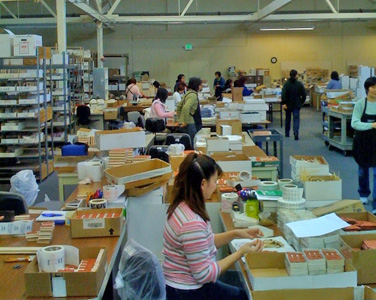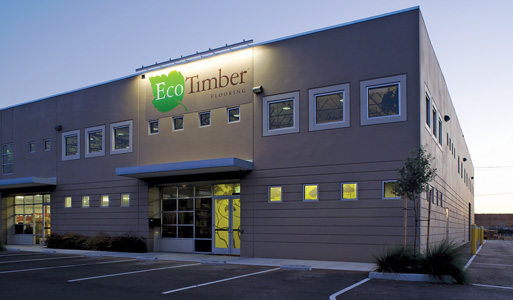Hero Arts, an international craft stamp manufacturing company, has found a new home inside the recently renovated Historic Cannery Building on Harbour Way in Richmond’s Marina district.

Employees assemble woodblock stamps by hand at Hero Arts manufacturing facility in the newly renovated Historic Cannery Building in Richmond.
Published: March, 2009
Hero Arts, an international craft stamp manufacturing company, has found a new home inside the recently renovated Historic Cannery Building on Harbour Way in Richmond’s Marina district. For the last 20 years, Hero Arts has been located in Emeryville, but recent zoning changes forced the company out. During his search for a new location, Aaron Leventhal, CEO of Hero Arts called Paul Levitan, CEO of Galaxy Desserts, whose company relocated to Richmond in 2004. Aaron recalls that Paul had only positive things to say about Galaxy’s move, including the permitting process, and although I am a Bay Area product, I really hadn’t been to Richmond very often. So Aaron drove over to Richmond’s Marina Bay to check things out and immediately became enamored with the area. I soon realized this is a beautiful location. he said.
Hero Arts was founded 35 years ago by Jacqueline Leventhal, a Berkeley art teacher and photographer. During a 1973 San Francisco art show at the De Young Museum featuring her photos, she received a fan letter decorated with stamped images. The images intrigued her so much that she bought a rubber vulcanizer and began making her own stamps in the bathroom of her Berkeley apartment—because it was the only room with a three-prong power outlet. She started selling the homemade stamps on Telegraph Avenue in Berkeley and then at craft fairs, gift shows and through local retail outlets. It is from these humble beginnings that Hero Arts was formed.
The business incorporated in 1981, and soon expanded to national and international distribution. Around this period of time, Jacqueline’s son, Aaron, worked in various capacities at Hero Arts while attending high school and college, including the packing and shipping departments, customer service and sales. In the late 90s, after earning a B.A. in economics and a Masters in international affairs, Aaron was hired as a strategic consultant to assist with international distribution and streamline inventory. About two years ago, Aaron purchased the company from his mother.
Aaron says that the City of Richmond was extremely helpful during the permitting process, which was also accomplished very quickly. The facility turned out to be perfect for his particular needs, including a large warehouse area that could be connected to front offices. Hero Arts moved into its new location in November of last year, and Aaron couldn’t be happier with it. I would recommend Richmond for many reasons. It’s a good central location in the East Bay with good connections to shipping and freeways, it is quiet and hospitable to the business environment and it’s a place that I think is up and coming.
While many competitors have turned to outsourcing production overseas to places like China, Hero Arts continues to hand-make its woodblock stamps here in the United States. The company is more of a traditional manufacturing company and it takes pride in the fact that it still makes products by hand locally using local materials and local employees. As a matter of fact, the average employee has been with the company for fifteen years.
Since the company sells into the craft market, the bad economy does not affect it as much as other businesses. According to Aaron, In an economy like this, a lot of people do crafts at home instead of going out to the movies or dinner, adding, in a time like this I think people want to get back to basics. Plus, to save money, many people today are creating their own gifts instead of buying more expensive presents at the store.
Another added bonus Hero Arts received by relocating to the Cannery Building in Richmond is that the company was eligible to participate in the California Enterprise Zone (EZ) Program. As one of only 42 local jurisdictions in California that have an EZ designation, the City of Richmond is able to increase business investment and promote the creation of new jobs in Richmond by offering special state tax incentives. Aaron says, The Enterprise Zone is a great reason for businesses to locate in Richmond. Giving incentives to hire local employees creates a synergy with the community, increasing local employment, shortening commute times, and making businesses stronger through lower taxes. Approximately 80 percent of my employees qualify for the program.
Another company that recently made Richmond’s southern gateway its new home is EcoTimber Flooring. EcoTimber, founded in 1992, is the first company in the world created solely to sell sustainable wood products, and the only flooring company devoted exclusively to forest protection and indoor air quality.
EcoTimber’s offices were formerly located in San Rafael while its warehouse was in San Leandro. Due to growth and the desire to have the company’s offices and warehouse in the same location, the owners decided that they needed to make a move. A big reason that EcoTimber decided on the new Richmond location on Central Avenue—sandwiched between I-580 and I-80 just before the roads merge—was the central location in the Bay Area. According to Lewis Buchner, EcoTimber’s CEO, I didn’t want to loose key employees; we had people in San Francisco, Oakland and Marin and this was centrally located enough that we could afford to move here without losing anyone. He added, We’re a manufacturer and we distribute our products to our own distributor network. Richmond is extremely well located in terms of being a transportation hub.
Another reason Richmond is a good fit for EcoTimber because of its location in the I-80 Green Corridor that was recently formed by Richmond, Berkeley, Emeryville and Oakland. There’s a real initiative in Richmond to create a nexus of green businesses, and the more green businesses we can attract here the better it will be for all of us. Buchner says if you are a green business, Richmond is the place to be: We’ve got some really good core green businesses here and it would be very good for the local economy and for businesses to be thought of as part of the I-80 Green Corridor.
EcoTimber brings positive change to the way forest ecosystems are managed worldwide by offering wood products that come from the highest standards of sustainable forest management. The company is committed to providing its customers with high-quality, beautiful and healthy products that are free from toxic materials. One of its goals is to demonstrate that highly ethical business practices can be sustained without sacrificing financial success, and to prove that integrity and passion can go hand in hand with profitability.
EcoTimber promotes forest conservation worldwide by selling only sustainably harvested and reclaimed wood products. Its forestry practices guarantee a perpetual yield of high-quality timber while maintaining or restoring healthy, self-regenerating forest ecosystems. The company specializes in wood products from forests that are certified well-managed according to the rules of the Forest Stewardship Council (FSC), as well as wood alternatives such as bamboo. EcoTimber offers a wide range of beautiful domestic and exotic hardwood and bamboo flooring all milled in standard formats with warranties that match the best in the business. By purchasing the products sold by EcoTimber, the consumer is casting a vote for sustainable forests and helping conserve forests through responsible wood usage.
Buchner is a skilled cabinet and furniture maker. He was originally a journeyman woodworker by trade who also ran a sizeable architectural woodworking business in San Francisco. In the late 80s, he began getting involved in environmental issues with a focus on sustainable forestry. Buchner says, I’ve made a living from wood products, as have my ancestors for many generations, and I feel a certain debt to forests and trees.
After hearing about the burning of the rainforests in Brazil, Buchner started wondering about rosewood, mahogany and other tropical species that he was using, and wanted to source them sustainably. This, in turn, led to his involvement with some of the early sustainable forestry organizations that eventually formed the FSC—the only credible environmental certification system for wood products today. There are now over 200 million acres of forests worldwide that are managed under the FSC guidelines, and the area is increasing rapidly. The reason for its growth is that architects, homeowners and businesses are increasingly requesting sustainable wood to use in their projects. It’s been very rewarding to see something that started out with a few kind of ‘green hippies’ in the early 90s become a really powerful force in the world of industrial timber worldwide, says Buchner.
Richmond Community
Redevelopment Agency Office of Economic Development (510) 307-8150 Richmondca4business.com

Woven Bamboo flooring made of Bamboo strands pressed together form this gorgeous sustainable flooring from EcoTimber.

A big reason that EcoTimber decided on the new Richmond location on Central Avenue—sandwiched between I-580 and I-80 just before the roads merge—was the central location in the Bay Area.

